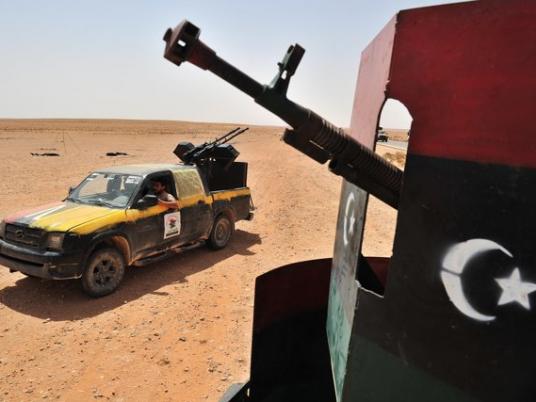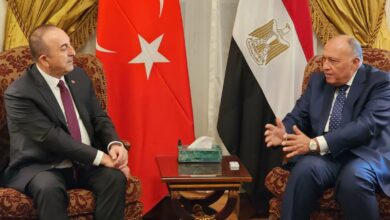
TRIPOLI — When the Tripoli International Airport was seized by the Awfeya brigade on 3 June, the blitz interrupted a transition that continues to be punctuated by sporadic outbreaks of violence and political divisions that remain in Libya ahead of elections for the National Congress.
The militia from the western Libyan town of Tarhouna stormed the airport to protest the mysterious disappearance of militia leader Abu Ajeila al-Habishi from the capital in early June. Habishi had established his battalion to fight the spillovers of the old regime following the revolution. The standoff was resolved within hours after interior ministry forces arrived, but the damage was already done.
“Tarhouna did well to move on, and now the people who actually fought against [former President Muammar] Qadhafi from the first day made a mistake that will haunt the city for few months,” says Waleed Hassan, a candidate from Tarhouna for the 200-member National Congress election, set to take place in three weeks.
Besides alarming already skeptical investors about the situation in Libya, the attack raised many questions regarding the ability of the transitional authorities to handle the pre-election period, given lingering security challenges exacerbated by a hindered reconciliation process.
Given that it took eight months of bloodshed to bring Libya out of dictatorship, it was always expected that the transition would not be smooth. Seven months after the announcement of liberation, Libya is set to vote for the National Congress. Almost 2.7 million registered to vote, amounting to 80 percent of eligible voters.
For many Libyans the elections promise stability, but many challenges lie face the transition before they begin voting. Politicians consider reconciliation a critical challenge before the poll, and especially before the constitution is drafted.
Recent efforts to bridge the gap between the revolutionaries and supporters of the former regime by Muslim Brotherhood member Sheikh Ali al-Sallabi, who was asked to arbitrate by Mustafa Abdel Jalil, the head of the National Transitional Council, have met strong criticism. Sallabi reportedly conversed with pro-Qadhafi tribal confederations in Cairo last May, including Qadhafi’s cousin Ahmed Qadhaf al-Dam.
Nevertheless, there’s a widespread belief that reconstruction and security problems can only be solved through reconciliation.
“Reconciliation is very important to move forward,” says Hassan. “People don’t understand how some use the loyalist label to exploit others for their personal interest.”
Closely tied to the reconciliation question is security, which remains a struggle on all levels, with the airport characterizing for this challenge.
According to a senior interior ministry source, the alert level has been raised to deal with any kind of threat. Based on intelligence reports, all cars with large trunks, and ambulances in particular, will be closely monitored to foil any attempt to destabilize the country.
Increasing weapons proliferation epitomizes the lingering instability, and interim authorities have a limited mandate to solve the problem. In this vein, many believe the elected National Congress will be the one entity in a position to solve the problem of armament. For now, the interim authorities believe that the national police alone cannot be fully responsible for providing security and that the armed forces should have a stake.
Another issue is the lack of any governing structure, which means a lot of work for the transitional council as they have to not only manage the country until the elections take place, but work out the governing process to manage the country with temporary laws.
The authorities issued dozens of temporary laws to cope with different challenges. The decisions issued by the transition council have been met with severe criticism on many occasions. For one, a law granting immunity from prosecution to members of the former regime working in favor of the revolution was criticized on the basis that it promotes “selective justice,” as human rights watchdogs labeled it.
Nevertheless, many see tomorrow’s Libya in the elections.
Abdel Hakim Belhadj, the former head of the military council of Tripoli, thinks that the elections will be the turning point.
“After all the sacrifices, the feeling of going to elections is nothing less of an achievement. We know the future of Libya is important to all of us, and that is why we have to think above personal interests,” he says.
“The National Congress will solve many outstanding issues of the country, and this is why all parties are preparing for the electoral campaign to inform the people of their message. It is the only way to succeed in the elections,” he adds.
Leaders of different political parties are already working on their electoral campaigns. Decentralization and federalism top the agenda, although no political party has spoken in favor of federalism. In fact, few leaders have openly criticized it.
However, outside of party leadership, these calls for federalism have resonated in eastern Libya, where the revolution first erupted. Federalism is vehemently rejected by people elsewhere in the country who fear that it will threaten Libya’s geographical integrity. At an anti-federalism rally in Tripoli in March, protesters carried a sign that read “Betraying the martyrs’ blood,” referring to the scores who gave their lives for a free and united Libya. The issue has been divisive for public opinion.
But for some, undoing the legacy of Qadhafi is a challenge that transcends the electoral divisions.
For Hadi Harrari, the minister of local government, the political culture during the time of Qadhafi is the main threat for the future of Libya.
“There is no infrastructure in Libya. Corruption is an epidemic and it starts from the very bottom. The people have no faith in the system,” he says.
“We need a perfect local governance law to start the development as soon as possible, but after 42 years of tyranny, we also need a little bit of patience.”




